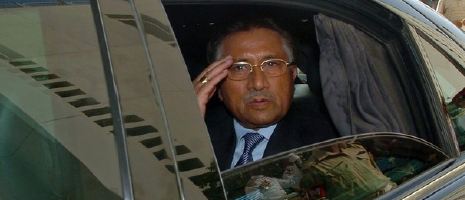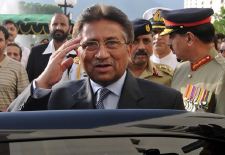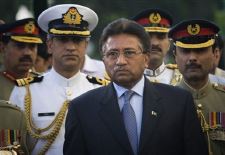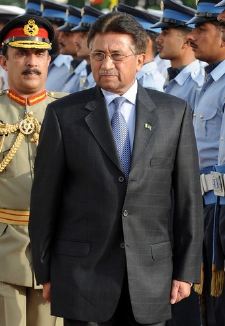Adil Najam
In a nationally televised speech, Gen. Pervez Musharraf, President of Pakistan, has just announced his resignation, pre-empting a move to impeach him by the parliament.
This post has been updated to add news photos from this momentous day in Pakistan’s political history. The pictures speak eloquently of the moods and thoughts of the day. (Scroll down to see the video of Gen. Musharraf’s resignation speech).
Participate in a poll on what might be Pakistan’s future post-Musharraf, here.
![]()
Here is a Pervez Musharraf time-line, published in The News:
August 1943: Born in Delhi, India
1964: Joins Pakistani army.
1998: Becomes army chief of staff.
October 1999: Seizes power in a bloodless military coup, overthrowing the prime minister, Nawaz Sharif. In response, the Commonwealth suspends Pakistan’s membership.
June 20 2001: Makes himself president, replacing Rafiq Tarar, while remaining head of the army. Tarar is forced out of office when the parliament that elected him is dissolved.
July 2001: Holds first meeting with the Indian prime minister, Atal Bihari Vajpayee, at Agra in India. No progress is made because of differences over the disputed territory of Kashmir.
September 2001: George Bush courts Musharraf, asking him to join him in his “war on terror” and help defeat the Taliban in neighbouring Afghanistan. The US president promises Pakistan $1bn in aid.
April 2002: Wins a referendum giving him another five years in office. Observers criticise the referendum as blighted by irregularities.
May 2002: Pakistan test fires three medium-range surface-to-surface missiles capable of carrying nuclear warheads. Musharraf insists his country would not be the one to initiate war.
August 2002: Consolidates his power still further, giving himself the right to dismiss an elected parliament.
October 2002: Pakistan’s first general election since Musharraf seized power in 1999 results in a hung parliament.
November 2002: Mir Zafarullah Jamali becomes the first civilian prime minister since 1999. He is a member of a Musharraf-supporting party.
November 2003: Pakistan’s National Assembly meets for the first time since 1999.
December 2003: Musharraf promises to step down as head of the army by January 2005.
May 2004: Pakistan is readmitted to the Commonwealth.
December 2004: Musharraf announces he will stay on as head of the army.
August 2005: Pakistan tests its first nuclear-capable cruise missile.
March 2007: Musharraf suspends the chief justice, Iftakar Mohammed Chaudhry, triggering a wave of anger across the country and the first joint protests held by the parties of exiled former prime ministers Benazir Bhutto and Nawaz Sharif.
October 2007: Signs a corruption amnesty, opening the way for Bhutto’s return and a possible power-sharing agreement. Within hours of Bhutto’s arrival back in the country, bombers attack a Bhutto rally in Karachi, killing more than 100 people.
November 2007: Declares a state of emergency, rounding up opposition leaders at gunpoint. In the same month, Musharraf quits as head of the army, becoming a civilian president.
December 15 2007: Lifts state of emergency and announces plans to go ahead with parliamentary elections scheduled for January 8.
December 27 2007: Benazir Bhutto is assassinated at an election rally in Rawalpindi.
January 2008: Elections postponed until February 18.
February 2008: The two main opposition parties gain a clear majority in the elections.
August 2008: The two main parties strike a deal to impeach Musharraf if parliament backs the move.
August 18 2008: Musharraf announces his resignation



























































Here is the saddest thing to note in the comments here.
Most of the people who supposedly “support” Musharraf, read their comments and they are saying also that they hate Pakistanis and Pakistan. They speak of Pakistanis and Pakistan as if they are someone else (maybe they are). They have no sense of identity and pride in Pakistan, just in their dictator.
That was Musharraf’s problem too. He did not care about Pakistan or Pakistanis too, only his own power. His supporters are exactly the same.
Like others I am also struck by how motivated people are by their hatred for democracy and how little faith they have in Pakistanis and the electoral choices Pakisatnis have made.
Their support for Musharraf comes only from their hatred for democracy and for ordinary Pakistanis. I guess it is those few who are willing to sell of Pakistan and Pakistanis that support Musharraf.
I am amused at the demented logic of the MUSH-Haters on here…
If you like Musharraf you must be ISI or the devil itself!
Well I got news for you, its democracy in Pakistan now thanks primarily to……yep…….you guessed it…….Musharraf! and my right to differ from you is as important as your right to differ from me. I do not remember having that or a free media prior to 1999…..do you?
If you go with the formula of MAJORITY IS ALWAYS RIGHT! well majority of Pakistanis also elected BB and Ganja Khalifa twice and look where it took the country in the first place in the1990’s…….corruption, bankruptcy, bad fiscal management, declaration of Pakistan as a a failed state, we almost became a khilafat to be ruled by a civilian ganja khalifa! Lets hope that democracy is here to stay and that these politicians act their part sensibly and not like the intolerant Mush-hating twits putting their posts on ATP!
I think what happened in Pakistan yesterday is very good for Pakistan and makes me feel proud of being a Pakistani again.
A democratic parliament removed a tyrant dictator. And we the people did it without restoring to teh tactics that dictators use. No one was put in jail. No one was hanged. No one’s house was attacked by soldiers. We used the vote in the four parliaments and we established the principle that Pakistan belongs to the people of Paksitan and not to any one general or dictator.
Jeevay jeevay Pakisatn.
Musharraf is history…let’s focus on future looting and plundering. That will probably make our endless analysis of “who did what” a little less boring.